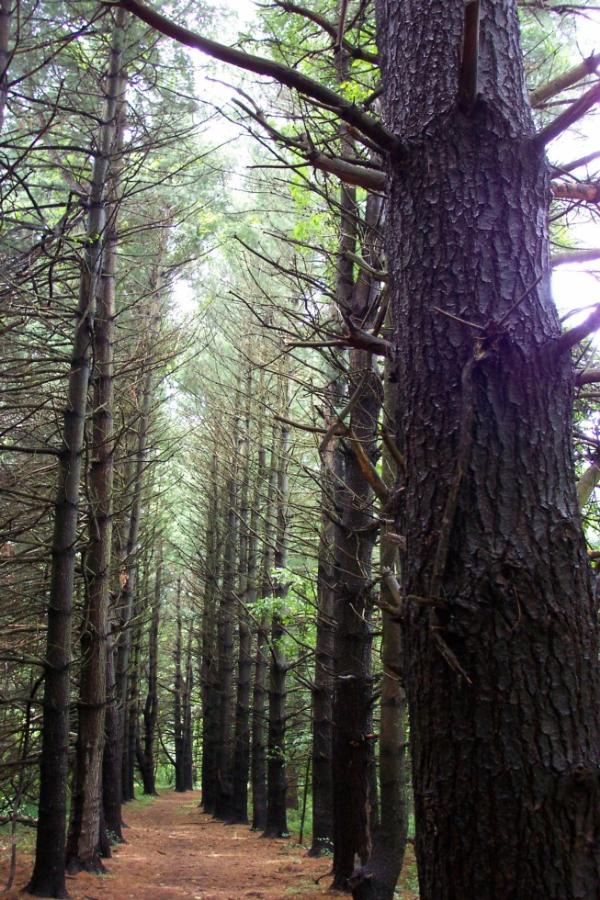
oakenwood
-
Posts
238 -
Joined
-
Last visited
Posts posted by oakenwood
-
-
Most ciphers are of the substitution variety. To solve them, you make a list of the given characters, then count how many times each occurs. Then consult a table of letter frequencies. The most common symbol will probably be the letter "e", but not always. Match up symbols to letters, and see if the message makes sense. If not, try switching the letters around. Pretty soon, you'll see some words emerge.
There are some other types of ciphers used. Sometimes the cache owner tells you what kind; other times you'll have to guess. There's plenty of help online; try a search for "cryptanalysis" or the kind of cipher. There are even forums for cryptanalysts. You might try letting them solve it. That's sort of cheating, though.
-
EVERYBODY PANIC!!! (or not.)
There's always GLONASS to fall back on.
 They're pretty much up to full coverage again. To be safe, you can get a dual GPS/GLONASS receiver.
They're pretty much up to full coverage again. To be safe, you can get a dual GPS/GLONASS receiver.Or practice your map and compass skills.
-
A homeless guy sleeping.
It was in a small park and he wasn't more than 20' from the neighbor's fence and 70' from their house. Walked up to the park and turned around and left without searching. But judging by the distance on the gps, he was within 10' of the cache.
So did you post a DNF?
-
Today I was at a Swap Meet (Flea Market for some of you) and found a geocache container
After aquiring the geocache I opted to leave it where it was and come back later. Having learned about geocaching, I took my newfound knowledge and, wanting to be able to find the spot again in a sea of similar looking "booths" I used my handy-dandy GPS and set a waypoint for the booth where the cache was left.
I set other waypoints for other booths where the same sequence of events transpired.
Several hours later I was able to follow the waypoints right back to where my purchases were left, including my new geocache container
What has geocaching taught you that helped you later in life?
You know, that was exactly the reason why I originally bought a GPSr-- to mark spots I wanted to return to. Except in my case, it was good places for hunting. Also my car, so I could get back to it.
Geocaching was a happy discovery after the fact.
Other things I've learned? The power of a good bug repellent. How slippery things can be after a good rain. The need to carry spare batteries. And foremost: to always bring a camera.
-
Sign up for the Groundspeak weekly email. It includes a list of that week's new caches in your area, sorted by the distance to each.
-
I see... I just got a Garmin eTrex Venture HC.
So is the best thing to do, then, to hand-type the important stuff in?
Or should I really just stick to paper caching?
I have your exact model of GPSr. Here's how I go paperless:
First, I read the cache page, including hints and other finders' posts. Then I download the .loc file.
Next, I open the .loc file in a text editor. Then I replace the nameid and CDATA strings with important info. The nameid usually becomes the actual cache name instead of its number, and the CDATA string will look like "233 ammocan hollow log". The first three numbers are the size, difficulty and terrain, rounded up to the nearest whole number. After that are hints about the type of cache, placement, and anything else that's helpful.
The nameid string has a maximum of 14 characters. The CDATA string has a maximum of 30 characters. Then I load them on my Garmin using GPSbabel.
In the past, I would write this stuff in a notepad. I still use the notepad, but just for recording what I took and left.
-
I mostly "deer walk", or walk crouched over to follow deer trails. Sometimes I encounter thorns. If I can just step on them and walk over, I will. This means that I occasionally look like someone from the "ministry of silly walks", as I'm crouched over and trying to get my foot on top of a thorny branch three feet up.
Sometimes I break a branch to get by. More often I choose a path that's a little longer, but has less obstructions. That's part of the fun of geocaching for me. I look ahead and choose a path from the available options.
I've never used a machete or walking stick. If the spider webs are bad, I'll find a long twig and wave it in front of me.
-
Bug repellent. An absolute must around here from April to October.
Gloves. They keep your hands clean and protect against critters that bite and sting.
Notebook. Helps you keep track of what you left and took at the caches.
Camera. Geocaching is so much more fun with a camera.
Flashlight. Illuminates dark crevices, hollow trees and logs, etc.
Things that others mentioned but that I never carry:
Compass. Have one, never needed it.
Space blanket. Have a few of those, too. They stay in the car.
Glow sticks. I have a flashlight.
Walking stick. If the spider webs are bad (and they often are) I just wave a long twig in front of me.
Tweezers. I thought I'd need these, but never have.
-
Garmin eTrex Venture HC. My first, and so far only, unless you count my GPS-enabled cell phone.
I've even figured out how to edit .loc files to go paperless with it.
-
Great story. That's why I love caching. There's an adventure, a search, and a reward. It can be compared to RPG's like D&D, or to video games like WoW, but it has that reality aspect that makes it so compelling. You're out there in the real world, using magic devices (global locator, cast continual light, repel insects +2, capture image) and if you can brave the elements, the pests, and the terrain, your search might be rewarded with a treasure chest.
Then there's the time I failed my saving throw versus poison ivy, but that's another story.
-
I always bring a camera. It's one of the things I like best about caching.
Something in the woods near a cache.
And some other assorted pics:




The last one is the "Hall of Pines" near Crash Cache.
-
I once lifted up a lamp post skirt to find the cache and a roach. I'm not talking about blattidae, either.
-
Travel bugs and lottery tickets.
-
Another option if you forgot your ink stick of choice but for some reason remembered your camera. Take a picture of your GPS and the log and load it into the log entry. Just make sure your not posting a spoiler pic.
I did that once with a cache whose log had turned into a wet, moldy lump of fiber. It was either that or scratch my log entry on the inside of the cache container.
-
"A beautiful day for caching. Found it after a brief search. Turns out I forgot my pen. The blob of earwax-- that was me. TFTC!"
-
This was inspired by the "gloves" thread. Have you ever found a cache "guarded" by unpleasant critters? Bees, wasps, possums, vorpal bunnies...
What did you do?
Last summer, a nest of wasps took up residence in a local cache called, ironically, A Safe Cache 'N Dash. I didn't have time to wait for nightfall, so I posted a DNF. That's one way to deal with it.
-
If you're worried about critters that bite, duty gloves (also called pat-down gloves) are your best option. Look for a Kevlar lining. It's there to stop knives and needles, but will stop fangs, too.
Mechanix gloves are good for avoiding skinning your knuckles while turning wrenches, but they don't have any with Kevlar. I could add that they're bulky, ugly and pricey, but that's just my opinion.
Normal search gloves (pat down gloves) won't stop needles! And likely won't stop fangs either, so I wouldn't depend on them for that. Kevlar in most duty gloves is an open mesh weave fabric and as such will resist most cuts from a sharp edge, but a needle will pass right through! I use mine almost every day, and am still often wary of needles on any of my "clients".

For needle "resistant", and thus likely fang proof too, you will have to go with something like TurtleSkin gloves. I believe that are a much tighter weave of kevlar, but are also very expensive.
Better a stick swiped around in the hole first

I stand corrected. Not all kevlar gloves are needleproof. Some are though. To find those, use search terms like "needleproof" and "puncture resistant".
Truth is, I don't use either. I use gloves sometimes if I'm worried about the cache location, but I just use plain old leather gloves. I also worry that poking around with a stick could stir up a nornet's nest-- literally.
I think I'll start a thread about critters and caches, and how to handle them.
-
There have been claims that activating WAAS will shorten your battery life, but someone posted a study here refuting those claims.
My biggest problem with WAAS is getting reception from one of the WAAS satellites. There are supposed to be two visible from here, but I sometimes have trouble getting one. There's a third up there supposed to be going into service late this year; maybe it'll help.
-
I'm developing a device that allows GPS receivers to return each satellite's signal, allowing it to redistribute the signal to other receivers. There are some glitches with the timing, but I'm sure I'll have it worked out soon.
Then I'll begin work on a signal multiplier. It will return the signal from each satellite to all visible satellites. Then the more people that use the system, the more signals that will be available. It'll help offset the signal hogs using old-style receivers.
-
A couple of stray dogs, but it's more like they found me. They were friendly, though.
-
If you're worried about critters that bite, duty gloves (also called pat-down gloves) are your best option. Look for a Kevlar lining. It's there to stop knives and needles, but will stop fangs, too.
Mechanix gloves are good for avoiding skinning your knuckles while turning wrenches, but they don't have any with Kevlar. I could add that they're bulky, ugly and pricey, but that's just my opinion.
-
It is totaly amazing just by reading some of these posts just how many of you could talk your way into jail rather than using a little common sense/courtesy when you are stopped by the Police. Being a self imposed "lawer" that watches to many TV shows or a self proclaimed ACLU activist will not get you anywhere, you can be detained. I did read one post refering to post 911 and yes, we are more suspicious now. And yes, drug dealers have been known to use a GPS to drop off and pick up drugs. So use your head for more than a hat rack or hair factory. If you are stopped by law enforcement, try explain to or show him or her what you are doing, it may save some time, embaresment, and possibly some money. Be safe, be careful, and enjoy our sport.
Mexia Cop
Waiving one's constitutional rights is neither common sense or courtesy. It's idiocy. As a LEO, you know that the law is an adversarial process: there's a winner and a loser, as reflected by the "v." in the middle of every case name. The contest starts from the very moment of contact. It's not a "let's just get along and everybody will be happy" sort of thing. The game is played to be won. LEO's play the game every day, giving them a strong advantage.
I know that most citizens are ignorant of their rights and will just go along with every command a LEO gives them. You may not like it when people get all fourth-and-fifth-amendmenty on you, but they're right to do it. I know the derogatory terms police have for people like that: "roadside attorney", etc. That doesn't give police the right to mete out extra-judicial punishment to those who lawfully stand up for themselves.
Even people who have done no wrong (or think they have) can get into trouble. We recently had a thread here about a geocacher in Texas who did no wrong, but was stopped by the police because somebody thought he might be planting a bomb. He got arrested, although the charges were later dropped. He's probably never going to geocache again. He was a CO and archived all his caches. If you read between the lines of the story, he was cooperative-- too cooperative. A big mistake, as it turns out.
-
Whether you are required to provide ID varies by state. It depends upon whether that state has a "stop-and-identify" statute on the books. See the list here.
-
Not many. This area is a cache dead spot. DC's just as bad. It's better across the river in Virginia, but that's too far for me. For some reason, caching just hasn't caught on around here. Not like the west coast, anyways.

GPS accuracy test
in General geocaching topics
Posted
In place of the nail, you can use an adjusted benchmark, if it's convenient. You'll just have to pretend not to know where it is.